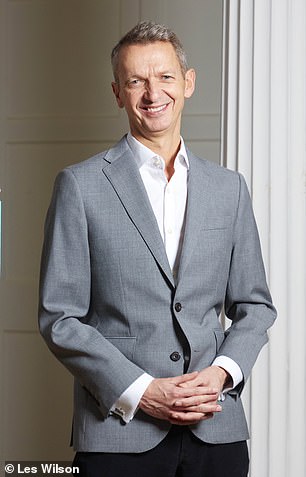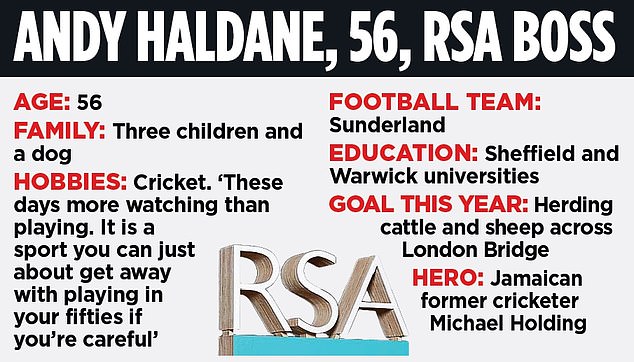Economics guru Andy Haldane warns: 'It's time to change the high interest rate mindset'

Colorful language: Andy Haldane is a proud northerner
When is it time to start lowering interest rates? That is the question on the lips of every urban economist. It's also a concern for millions of borrowers.
Andy Haldane, the former chief economist of the Bank of England and a hugely influential figure in the financial world, thinks it may be too early. But he argues it is time for the Bank to stop threatening to increase them.
Haldane, who worked at the Bank for 32 years, thinks insisting – despite skeptical markets – that interest rates may need to rise further is a mistake.
“My interpretation of the economic tea leaves right now is that this is not what the economy needs, because of the fear for jobs, for incomes, for mortgage payments and for rent payments,” Haldane says.
'You can see that in the studies. You can see that in the conversations people have.'
He's been right before. In the spring of 2021, he warned that the Bank of England needed to take action to curb inflation – a call that went unheeded until it finally started raising rates late that year. Now he is once again urging his former colleagues to change course – this time in the opposite direction.
The Bank has raised interest rates to 5.25 percent as it strives to bring inflation back to its 2 percent target, but is still far from achieving that target.
Higher interest rates are affecting millions of borrowers as they add hundreds of pounds to their monthly mortgage bills. They also make life more difficult for entrepreneurial companies that need to borrow to start or expand.
Britain, says Haldane, has a bright future. But over the past 18 months the economy has only managed to 'just stay on track' in avoiding a recession – helped in part by consumers using their savings to maintain spending.
Now that those savings are drying up and higher mortgage costs are being paid, he states that lower financing costs should be a priority of the interest-rate-setting Monetary Policy Committee.
While it “may be premature” to vote for actual cuts now, he says “we are entering a period with a strong tendency towards easing” and “the story should move in that direction.” In plain English: the committee should think about it carefully.
Partly due to the current economic weakness in Britain, markets are betting that interest rates will be cut from spring this year. These bets are already impacting mortgage rates, meaning they will continue to fall even without intervention from the Bank of England.
Does the mere talk of rate increases add to the uncertainty for borrowers?
“I think it can be done,” says Haldane. 'The good news is that the financial markets have taken a different view of the central banks and that this is now reflected in the actual mortgage interest rate.
'Mortgage rates have therefore fallen from their peak, but are not led in that direction by the central bankers, but by the financial markets. Could there be room for central banks to encourage financial markets rather than lean against them? I think that would be desirable.' While the Bank has an inflation target of 2 percent, Haldane says it will become less of an issue once inflation reaches around 3 percent, perhaps in the second quarter of this year.
Although inflation is the 'topic du jour' when it is 10 percent, “at 3 percent that is not true,” he says.
“At 3 percent people stop talking about inflation,” Haldane emphasizes. In that case, especially if the economy looks weak, he says that “the right thing for the Bank to do is to release the brakes and get growth going again.”
Haldane worries that more and more borrowers are falling behind on payments and that homelessness and debt burdens are increasing.
“I think in that situation the right thing to do is to loosen the economy a little by lowering interest rates,” he says.
At the Bank of England, Haldane gained a reputation for his original thinking and colorful choice of words.
He famously warned during the pandemic of the grim “Chicken Licken economics” – a fear that is on the verge of collapse.
Since leaving the Bank in 2021, he has led the Royal Society of Arts think tank. Haldane spoke to The Mail on Sunday at the RSA's beautiful Georgian headquarters. The organisation's full title, 'the Royal Association for the Promotion of Arts, Industry and Commerce', dates back 260 years and reveals the think tank's broad remit.
A proud Northerner, Haldane, 56, is a father of three and was born in Sunderland and raised in Leeds before going to university in Sheffield and Warwick.
On his desk in the heart of London is a mug with the motto: 'You can take the boy out of Yorkshire, but you can't take Yorkshire out of the boy.' He is also a freeman of the City of London, which gives him the age-old right to herd cattle across London Bridge – a box he wants to tick this year. But it is in the north – Haldane has recently traveled to Liverpool, Sheffield and Sunderland – that he sees signs of an economic revival.
“I come back from these places and I'm completely overwhelmed by the energy,” he says. A few days before our interview, Haldane had spoken at an event organized by another think tank aimed at tackling 'stagnation' in Britain. “And yet, when I escape the Westminster bubble, I see dynamism and energy and progress and projects and companies taking it on,” he says.
Sunderland, the football team he supports, is currently languishing in the second tier of English football. But he thinks the club and the city are ready for better days.


He says: 'There have unfortunately been too many downs and not enough ups, but like Sunderland itself I think there are some real signs of green shoots – both at the football club and in the city.'
Hopes for the city have been raised by major investments such as those from car manufacturer Nissan. Another major investor is James Corden's film company Fulwell 73, which is building a major film studio on the banks of the River Wear.
“I really feel like this is a moment of rebirth – for North East England,” says Haldane.
One way to help boost growth, he argues, would be to spin off a separate Economy Ministry from the Finance Ministry – an idea that has had its advocates before and is common in other countries , but never caught on in Britain.
Haldane's version would take that ministry out of London and base it in Darlington, where the Treasury already has an outpost. He would have supervision exercised by a powerful American board of economic advisers.
It would be “the architect and vehicle for a national growth plan,” Haldane says.
He compares it to the way companies are managed, where a financial director is in charge.
“We cannot let the CFO determine the entire strategy,” says Haldane. 'Ultimately, the Ministry of Finance wants to prevent us from going bankrupt.
'It's about financing the project – not about deciding and financing the project.'
Haldane has not ruled out working with a future government, having previously been appointed by Boris Johnson to oversee a leveling taskforce.
'My approach has always been to speak openly to all political parties and provide my objective, apolitical advice.
'I'm very, very optimistic about Britain. But I also don't think that opportunity will arise unless we do some pretty big and bold policy things to fuel the growth engine.”
Haldane says he would like to “convince both Jeremy (Hunt) and Rachel (Reeves)” of any policy ideas. “What matters is the right policy,” he emphasizes.
Would he appear on stage at a party conference to endorse a politician – as his former boss Mark Carney did with Labour? “I think this runs the risk of decreasing your effectiveness,” he says.
Haldane has previously been reluctant to give his opinion on Brexit. Now, however, he acknowledges there are encouraging signs. 'I think it's a huge positive that the business community is continuing with it and looking at new markets and new investments.
“The car industry has been one of the most vocal about Brexit concerns and the fact that companies are adapting and indeed investing is something I find very encouraging.”
Some links in this article may be affiliate links. If you click on it, we may earn a small commission. That helps us fund This Is Money and keep it free to use. We do not write articles to promote products. We do not allow a commercial relationship to compromise our editorial independence.
